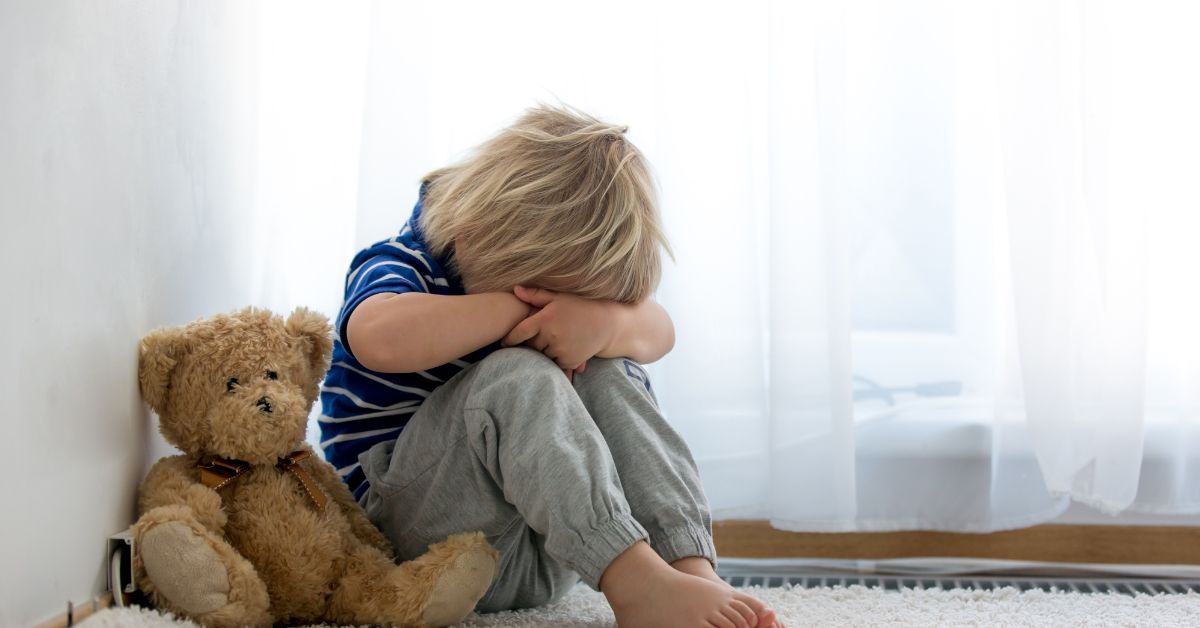When we think of addiction, we often visualize it as a dark, looming shadow that invades and consumes lives, leaving a trail of devastation in its wake.
But what if I told you that this shadow often has its roots embedded deep within the innocent soil of childhood?
It’s a startling concept, isn’t it?
Yet, the profound connection between childhood trauma and addiction is a reality that is as heart-wrenching as it is undeniable.
In this article, we will embark on a journey of understanding, unearthing the tangled roots of addiction and tracing them back to their earliest origins. Through a blend of personal stories, scientific research, and my decades of experience, we will explore this intricate relationship, shedding light on the darkness of addiction and, in doing so, illuminating a path towards healing and empowerment.
So, let’s start at the beginning, where all great stories do – in childhood.
Understanding Childhood Trauma and Addiction
Childhood trauma and addiction are two concepts that, at first glance, may seem unrelated.
However, the connection is far deeper than one might initially perceive. Childhood trauma, which refers to any distressing event or series of events that a child experiences, can have long-term psychological and physiological effects. This is particularly concerning if you have a daughter that may be addicted, as addiction is a chronic disease characterized by compulsive substance use despite harmful consequences. The link between these two can be a significant factor in understanding and addressing her struggle.
The link between these two lies in the way our brains respond to stress and trauma.
When a child experiences trauma, their brain and body learn to cope in whatever way they can, often through the release of dopamine, a chemical that provides temporary relief from pain. As the child grows, they may find themselves seeking out this dopamine release through substance use, leading to addiction.
The Department of Health plays a crucial role in addressing this issue, providing resources for trauma-informed care and addiction treatment, promoting awareness, and advocating for policy changes to better support affected individuals and families.
FREE: Get the 3 pieces of advice that helped me understand this disease of addiction
Examples of Childhood Trauma
| Type of Trauma | Definition | Potential Long-Term Impacts |
|---|---|---|
| Physical Abuse | Deliberate infliction of physical harm by a caregiver or other individual. | Anxiety, depression, substance abuse, difficulties in forming healthy relationships. |
| Sexual Abuse | Involvement of a child in sexual activity that they do not fully comprehend or consent to. | PTSD, depression, anxiety, sexual dysfunction, substance abuse. |
| Neglect | Failure to meet a child’s basic physical and emotional needs. | Difficulty in forming healthy relationships, low self-esteem, depression, substance abuse. |
| Domestic Violence | Exposure to violence in the home, typically between parents or caregivers. | Anxiety, depression, difficulties in forming healthy relationships, substance abuse. |
Childhood trauma can take many forms, from physical or sexual abuse to neglect, domestic violence, or the sudden loss of a loved one. Each traumatic experience can significantly impact a child’s development and mental health, potentially leading to issues such as anxiety, depression, and, in many cases, substance abuse and several forms of addiction.
For instance, a child who grows up witnessing domestic violence may learn to associate love and relationships with fear and pain. This warped understanding can lead to feelings of unworthiness and self-loathing, which they may try to numb through substance use.
The Effects of Childhood Trauma on Future Substance Abuse

Childhood trauma is not just a fleeting moment of distress; it leaves a profound and enduring imprint on a person’s psyche and physiology.
This lasting impact can manifest in various ways, disrupting normal brain development, altering the body’s stress responses, and increasing the likelihood of developing mental health disorders.
Each of these factors can, in turn, contribute to a higher risk of substance abuse and addiction.
Disruption of Normal Brain Development
When a child experiences trauma, it can interfere with their brain’s normal development. The brain of a child is highly malleable and responsive to their environment. This characteristic, known as neuroplasticity, while generally beneficial, can also mean that traumatic experiences have a significant impact.
For instance, trauma can affect areas of the brain responsible for:
- Emotion regulation: The ability to manage and respond to emotional experiences appropriately.
- Fear response: The capacity to identify threats and respond to them effectively.
- Memory processing: The ability to store and retrieve memories.
Alteration of Stress Responses
Childhood trauma can also alter the body’s stress responses. Normally, our bodies respond to threats or stressors with a ‘fight or flight’ response, a series of physiological changes that prepare us to confront or escape danger. However, repeated exposure to trauma can cause this system to become overactive, leading to chronic stress and anxiety.
Increased Risk of Mental Health Disorders
The psychological impact of childhood trauma can lead to an increased risk of mental health disorders. These can include conditions such as:
- Depression
- Post-traumatic stress disorder (PTSD)
- Anxiety disorders
- Personality disorders
Each of these conditions can further complicate an individual’s emotional landscape, potentially leading to substance use as a form of self-medication.
The Path to Addiction: A Real-Life Example
Consider the example of a child who has experienced physical abuse. This traumatic experience can disrupt their brain development and alter their stress responses, leading to an overactive ‘fight or flight’ system and chronic anxiety.
To cope with this constant state of anxiety, they may turn to drugs, such as methamphetamine. These substances can provide temporary relief, a momentary escape from their inner turmoil. If you’re concerned about someone you love, knowing if they are on meth can be crucial in understanding their struggle and finding the right help for them. It’s important to be aware of the signs and take appropriate action.
However, this relief is fleeting, and the individual may find themselves using more and more of the substance to achieve the same effect, a pattern that can quickly lead to addiction.
GET: The 3 things that actually "allowed" me to help my son (and regain control again)
Co-occurring Trauma and Addiction
Co-occurring disorders, also known as dual diagnosis, is a term used in the mental health field to describe a situation where an individual is dealing with both a mental health disorder and a substance use disorder simultaneously. This combination can significantly complicate the individual’s condition, making both diagnosis and treatment more challenging.
In the context of adverse childhood experiences, unresolved trauma – whether it be physical abuse, emotional neglect, or any distressing experience – often serves as the underlying mental health disorder. This trauma, if left unaddressed, can lead to various mental health issues, including anxiety, depression, post-traumatic stress disorder (PTSD), and more.
The Cycle of Addiction and Unresolved Trauma
Unresolved trauma can perpetuate a cycle of addiction. The individual may turn to drugs and alcohol as a form of self-medication, attempting to escape their painful memories and overwhelming emotions.
This cycle often looks something like this:
- Step 1: The individual experiences a traumatic event in childhood, leading to emotional pain and distress.
- Step 2: The individual struggles to cope with this pain and distress, often due to a lack of healthy coping mechanisms.
- Step 3: The individual starts using drugs and alcohol to numb the pain or escape from their distressing memories.
- Step 4: The temporary relief provided by the illicit drug use leads the individual to continue using, eventually leading to addiction.
- Step 5: The narcotic use exacerbates the individual’s mental health issues, leading to a worsening cycle of trauma and addiction.
The Complexity of Treating Co-occurring Disorders
This intertwining of unresolved trauma and addiction can significantly complicate the recovery process. It’s not enough to address the addiction alone; the underlying trauma must also be addressed for successful treatment.
This means that treatment plans for individuals with co-occurring disorders often need to be highly personalized, taking into account the individual’s unique experiences, symptoms, and needs. Treatment may involve a combination of therapies, including:
- Psychotherapy: This can help the individual understand and process their traumatic experiences, develop healthier coping mechanisms, and address any underlying mental health issues.
- Medication: In some cases, medication may be used to help manage symptoms of mental health disorders or assist with the detoxification process.
- Support Groups: These can provide the individual with a sense of community and understanding, helping them feel less alone in their experiences.
- Holistic Therapies: Techniques such as mindfulness, yoga, and art therapy can help the individual manage stress, improve their mental health, and develop a healthier relationship with their body and mind.
How Childhood Trauma Leads to Addiction

The journey from childhood trauma to addiction is a complex one, often influenced by a variety of factors. This complexity becomes all the more apparent and personal when you’re dealing with a son that’s addicted. One key factor in this journey is the use of illegal (and some legal) drugs as a coping mechanism, a path that many such individuals, unfortunately, find themselves on.
It’s a path that’s seldom straightforward, often marked by twists, turns, and uncomfortable revelations. The complexity of going down this path can be attributed to several elements, but one key factor consistently emerges – the overindulgence of drugs as a coping mechanism.
The Impact of Trauma on a Child’s Psyche
When a child experiences trauma, their world is often turned upside down. The safe, predictable environment they once knew is replaced with a realm of uncertainty and fear. This disruption can have a profound impact on a child’s psychological development.
A traumatic experience can leave a child feeling:
- Confused and disoriented, struggling to make sense of what happened
- Overwhelmed by intense emotions they don’t fully understand
- Isolated, as they may feel different from their peers or believe that no one else could possibly understand their experience
The Absence of Emotional Tools
Children, by their very nature, are not equipped to process such intense experiences healthily. They lack the emotional tools and understanding that adults have developed over years of life experience. This absence of emotional tools can leave a child feeling trapped, with their traumatic experiences replaying in their minds like a broken record.
Turning to Drugs and Alcohol: A Dangerous Escape
As these children grow older, the weight of their unprocessed trauma can become unbearable. In their quest for relief, they may stumble upon dangerous outs – drugs or alcohol – that offer a temporary escape. These can numb their emotions, dull their memories, and provide a fleeting sense of “normalcy” or even euphoria.
However, this relief is short-lived and comes with a steep price. The more they rely on these to cope, the more their bodies and brains adapt to the presence of them. This adaptation can lead to tolerance, where they need to use more to achieve the same effect, and eventually, dependence and addiction.
The Dangerous Cycle of Addiction
Once ensnared in the cycle of addiction, it can be incredibly challenging to break free. The addiction serves as a constant reminder of the trauma they’re trying to escape, yet it also perpetuates the very pain they’re trying to numb. It’s a vicious cycle, one that reinforces itself with every turn.
However, it’s important to remember that while this journey is complex and fraught with challenges, it’s not a life sentence. With the right support, understanding, and treatment, individuals can break free from the cycle of addiction, process their childhood trauma, and move towards a healthier, happier future.
UPDATED: Discover the 3 life-changing things about addiction I wish I knew years ago
Detoxification and Rehab: Steps towards Recovery
| Stage | Description |
|---|---|
| Detoxification | The process of safely withdrawing from substances, often under medical supervision. |
| Rehabilitation | A therapeutic process to address the underlying issues contributing to addiction, often involving individual and group therapy. |
| Aftercare | Ongoing support following rehab, which may include therapy, support groups, and medication. |
Detoxification is the first step in treating addiction, helping individuals safely withdraw from the drugs or alcohol they are dependent on. Following detox, rehabilitation programs provide therapeutic support to address the underlying issues contributing to the addiction, such as unresolved childhood trauma.
The Department of Health plays a critical role in supporting these programs, providing funding, resources, and policy support to ensure that individuals have access to the help they need.
Empowering Families and Individuals: Strategies for Healing
| Strategy | Description | Potential Benefits |
|---|---|---|
| Education | Learning about addiction and trauma to better understand and support the affected individual. | Improved understanding, better communication, increased empathy. |
| Family Therapy | Attending therapy sessions as a family to address shared issues and improve relationships. | Improved family dynamics, better communication, collective healing. |
| Self-Care | Taking care of one’s own physical and mental health to better support the affected individual. | Reduced stress, improved mental health, increased resilience. |
Family support is a crucial component of recovery from addiction. Families can provide emotional support, help their loved ones access treatment, and create a stable, supportive environment for recovery.
Empowerment strategies can include educating oneself about addiction and trauma, attending family therapy sessions, and practicing self-care. The Department of Health provides numerous resources for families, including educational materials, support groups, and access to treatment services. Those who have endured childhood trauma may be more likely to experience struggles with self-worth and could potentially turn to substances to self-medicate their emotional pain. By understanding this, families can better support their loved ones through the healing process, reinforcing their worth and helping them find healthier coping mechanisms.
Breaking the Link between Childhood Trauma and Addiction

The connection between childhood trauma and addiction is a complex and deeply rooted one. However, with the right support and resources, it is possible to break this link and pave the way for healing and recovery. Detoxification, rehabilitation, and family support are all crucial components of this process, and the Department of Health stands as a valuable ally in providing these necessary resources.
Remember, seeking help is a sign of strength, not weakness.
If you or a loved one are struggling with addiction or the impacts of childhood trauma, reach out to a trusted resource. You are not alone, and help is available.
Frequently Asked Questions About Childhood Trauma
How does childhood trauma lead to addiction?
Childhood trauma leads to addiction by causing intense emotional pain and distress that individuals may attempt to cope with through substance use. This is often due to the lack of healthy coping mechanisms and emotional tools to process traumatic experiences. As these individuals grow older, they may turn to bad things as a means to escape their painful memories or numb their emotions, leading to a cycle of addiction.
What is the connection between trauma and addiction?
The connection between trauma and addiction lies in the way our brains respond to stress and trauma. When a child experiences trauma, their brain and body learn to cope in whatever way they can, often through the release of dopamine, a chemical that provides temporary relief from pain. As the child grows, they may find themselves seeking out this dopamine release through substance use, leading to addiction.
WATCH: Free, confidential workshop that explains how to "Love Another Way"
What are the 4 main things childhood trauma deeply affects?
Childhood trauma deeply affects a person’s mental health, emotional development, ability to form healthy relationships, and their risk for substance abuse and addiction. These impacts are often long-term and can persist well into adulthood, affecting various aspects of a person’s life.
What mental illness does childhood trauma cause?
Childhood trauma can lead to a variety of mental illnesses, including post-traumatic stress disorder (PTSD), depression, anxiety, and substance use disorders. The type and severity of mental illness can vary depending on the nature of the trauma, the individual’s personal resilience, and the support they receive following the trauma.
